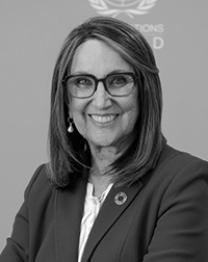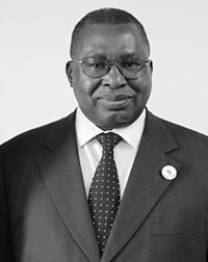The world is witnessing an uneven recovery from the coronavirus disease (COVID-19) pandemic. The poorer, smaller and more vulnerable a country, the more sluggish the speed of recovery. The current international trading system has so far failed to provide many of these economies with access to essential goods, including COVID-19 vaccines. To ensure a more resilient, inclusive and sustainable future, regional economic integration is becoming more critical than ever. Regional integration, particularly within regional trade agreements, is more responsive to the needs of developing countries, especially those which are smaller and more vulnerable. Regional trade agreements can also be a complement to the multilateral trading system in coordinating emergency recovery measures in a mutually beneficial manner.
Accordingly, this ministerial round table, entitled “Regional integration for a resilient, inclusive and sustainable future”, addresses ways to enhance the power of regional integration in support of the inclusive and sustainable recovery of developing countries. Specific focus will be placed on how regional integration can better help countries address socioeconomic needs in these recovery processes, including by developing fairer, greener and more inclusive markets for everyone.
This ministerial round table aims to promote tangible actions that will enable regional integration to establish and improve synergistic linkages between trade and socioeconomic and environmental imperatives.
Key issues
- With uneven recoveries from the COVID-19 pandemic, regional economic integration is more critical than ever to help developing countries, particularly the most vulnerable, bounce back stronger.
- Regional integration can complement the multilateral trading system in coordinating emergency trade and recovery measures in a mutually beneficial manner.
- It is critical to find ways to enhance the power of regional integration in support of inclusive and sustainable recovery for developing countries, with specific focus on socioeconomic needs.
Participants
Opening remarks:
- Ms. Rebeca Grynspan, Secretary-General, UNCTAD
Speakers:
- Ms. Marsha Caddle, Minister in the Ministry of Economic Affairs and Investment, Barbados
- Mr. Shri S. Kishore, Vice Minister, Ministry of Commerce and Industry, India
- Ms. Patricia Scotland, Secretary-General, The Commonwealth Secretariat
- Mr. Albert Muchanga, Commissioner for Economic Development, Trade, Industry and Mining, African Union Commission
- Ms. Eleanor M. Fox, Walter J. Derenberg Professor of Trade Regulation, New York University, School of Law
Moderator:
- Ms. Kaymar Jordan, Editor-in-Chief, The Gleaner Company
Watch recording of Roundtable III
There is some issue in accessing document path, Please contact to Site Admin
There is some issue in accessing document path, Please contact to Site Admin
Rebeca Grynspan, of Costa Rica, became UNCTAD's eighth Secretary-General on 13 September 2021 and is the first woman to lead the organization.
Prior to her UNCTAD appointment, she was the Ibero-American secretary-general from 2014 to 2021, also the first woman to head the organization. During her mandate, she has coordinated the 22-member Iberoamerican Conference and led four key summits of Heads of State and Government.
In 2010 she was appointed Under-Secretary-General of the United Nations and Associate Administrator of the United Nations Development Program (UNDP) and prior to that was UNDP Regional Director for Latin America and the Caribbean.
Prior to joining the United Nations, Ms. Grynspan served as Vice-President of Costa Rica from 1994 to 1998. She was also Minister of Housing, Minister Coordinator of Economic and Social Affairs, and Deputy Minister of Finance. In 2021 she was named Special International Advisor to the newly created Economic and Social Council of Argentina and invited to join as member of the G20 High-Level Independent Panel on Financing the Global Commons for Pandemic Preparedness and Response.
In addition to her experience as a lecturer and advisor to several international organizations, she has been actively involved in key United Nations initiatives, such as the Millennium Project's Task Force on Poverty and Economic Development and the High-level Panel on Financing for Development.
In 2014 and 2015, she was recognized as one of the 50 leading intellectuals of Latin America. And she was recognized as one of the 100 most powerful women in Central America by Forbes magazine.
Ms Grynspan holds a degree in Economics by the University of Costa Rica and a MSc in Economics by the University of Sussex. She has been awarded a Doctorate Honoris Causa by the University of Salamanca, the University of Extremadura and the European University of Madrid in recognition of her outstanding professional achievements.
Marsha Caddle is an economist, Member of Parliament and Minister for Economic Affairs and Investment in Barbados. Her specialties in Economics are financing for development; economic governance; competitiveness and investment; and inequality, social protection and human development. Prior to joining the Cabinet of Barbados, Ms. Caddle managed the Governance strategy of the Caribbean Development Bank, following her role as Programme Manager, Poverty and Economic Security with the United Nations Development Programme (UNDP). She also formerly managed the Economic Security and Rights programme of the then United Nations Development Fund for Women (UNIFEM) Caribbean Office.
Ms. Caddle received her Economics training at the Universidad Católica Santo Domingo, and has since continued her training in International Economics with the University of Utah, and in Poverty Analysis and Measurement with the Oxford Poverty and Human Development Initiative. She has been a member since 2006 of the International Association for Feminist Economics and the International Working Group on Gender, Macroeconomics and International Economics (GEM-IWG).
In her current role, among Minister Caddle's responsibilities are public investment, economic research and policy, physical planning and development, competitiveness and the growth environment, data and national statistics and climate change.
The Rt Hon Patricia Scotland QC is the 6th Commonwealth Secretary-General. She was born in Dominica and was their candidate for the post at the Commonwealth Heads of Government Meeting (CHOGM) in Malta in 2015. She is the 2nd Secretary-General from the Caribbean and the 1st woman to hold the post.
Patricia Scotland was born in the Commonwealth of Dominica. She completed her LLB (Hons) London University at the age of twenty and was called to the Bar at Middle Temple at the age of twenty-one.
Her career has been marked by achieving a number of extraordinary firsts, not least of which was to be the first woman in the more than 700-year history of the office to serve as Her Majesty’s Attorney-General for England and Wales and for Northern Ireland.
While holding these and other senior ministerial offices she was given responsibility, inter alia, for gender equality, domestic violence, forced marriage, and international child abduction, and from these positions promoted diversity and equality of opportunity, particularly for women and girls.
As the only woman to have been appointed Secretary-General of Commonwealth she is placing special emphasis on mobilising the 54 nations of the Commonwealth to tackle climate change – including its disproportionate impact on women – and, through women’s enterprise, to build the resilience of smaller or more vulnerable countries. Eliminating domestic violence and violence against women and girls is another area of focus.
Ambassador Albert Mudenda Muchanga is African Union Commissioner for Economic Development, Trade, Industry and Mining. In addition to these broad areas, the portfolio also covers tourism, investment, innovation, entrepreneurship, economic integration, economic policies and research, statistics and oil and gas.
He is formerly Commissioner for Trade and Industry. In this position, he provided strategic leadership in facilitating negotiation, conclusion and ratification of the Agreement Establishing the African Continental Free Trade Area (AfCFTA), which entered into force on 30 May 2019 and whose start of trading was launched on 1 January 2021. In addition, Ambassador Muchanga provided similar leadership on matters of trade, industrialisation, mining and customs cooperation. He mobilized the African private sector to play a greater role in the AfCFTA, culminating in the establishment of the African Business Council, Pan-African Manufacturers Association and Association of Chambers of Mines and other Mining Associations in Africa.
Ambassador Muchanga previously worked in the Zambian Civil Service at home and abroad, including as Permanent Secretary, Ambassador of Zambia to Brazil, Ambassador of Zambia to Ethiopia and Permanent Representative to the African Union and United Nations Economic Commission for Africa and as Deputy Executive Secretary of the Southern African Development Community (SADC).
Ambassador Muchanga works with ease at technical, professional, management, leadership and political levels.
Eleanor M. Fox is a professor of law and is the Walter J. Derenberg Professor of Trade Regulation at New York University School of Law. She teaches, writes, lectures and advises on antitrust law, competition policy and globalization, and has a special interest in developing countries and the interrelationship between equality and efficiency.
Eleanor was a partner at the New York law firm Simpson Thacher & Bartlett. She served as a member of the International Competition Policy Advisory Committee to the Attorney General of the U.S. Department of Justice (1997-2000) (President Clinton) and as a Commissioner on President Carter’s National Commission for the Review of Antitrust Laws and Procedures (1978-79). She has advised numerous younger antitrust jurisdictions including South Africa, Egypt, Kenya, Tanzania, The Gambia, Indonesia, Russia, Poland and Hungary and the common market COMESA.
Eleanor received an honorary doctorate degree from the University of Paris-Dauphine (2009). She was awarded an inaugural Lifetime Achievement award in 2011 by the Global Competition Review for "substantial, lasting and transformational impact on competition policy and/or practice" and lifetime, inaugural or other achievement awards from ASCOLA, AALS Antitrust Section, New York State Bar Antitrust Association, and the American Antitrust Institute.
With Mor Bakhoum, she wrote MAKING MARKETS WORK FOR AFRICA (Oxford 2019). Her other books include US and EU competition casebooks (with Dan Crane and Damien Gerard, respectively), GLOBAL ISSUES IN ANTITRUST AND COMPETITION LAW with Dan Crane, and readings on developing countries and competition with Abel Mateus.
Related
Event
- Ministerial Roundtable I: Scaling up financing for development
- Ministerial Roundtable II: Reshaping global and regional value chains
- Ministerial Roundtable IV: Harnessing frontier technologies for shared prosperity
- Ministerial Roundtable V: Supporting productive transformation for greater resilience in a post-pandemic world






